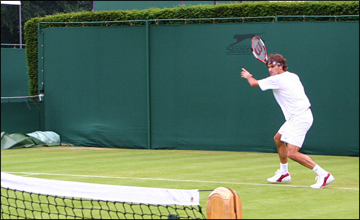What U.S. Sports Can Learn from Wimbeldon
What U.S. Sports Can Learn from Wimbeldon
Learning from Wimbeldon
I spent the Fourth of July weekend watching the Wimbledon Tennis Championships on television. I have done this for the last ten years, and this year I was amply rewarded. In a four-hour and forty-eight minute men’s singles final, the longest in Wimbledon history, Rafael Nadal, a twenty-two-year-old up-and-coming player from Majorca, beat the reigning Wimbledon champion, Switzerland’s Roger Federer, in a match that was brilliant from start to finish.
But for me the greatest reward at Wimbledon came from the fans and its All England Club setting. In contrast to America’s professional sporting events, which typically take place in huge stadiums dominated by exploding scoreboards, organ music, team mascots, and an audience trying to distract the visiting team, Wimbledon was the epitome of old-world restraint.
 Fans cheered only when a player hit a winning shot. There was a quiet silence on a missed shot, as if the last thing anyone wanted to do was add to a player’s embarrassment. The handful of Wimbledon scoreboards gave the information needed for informed watching—the time of the match, the game score, and the speed of the most recent serve—but there were no instructions on when to cheer, no electronic cartoon figures trying to get laughs.
Fans cheered only when a player hit a winning shot. There was a quiet silence on a missed shot, as if the last thing anyone wanted to do was add to a player’s embarrassment. The handful of Wimbledon scoreboards gave the information needed for informed watching—the time of the match, the game score, and the speed of the most recent serve—but there were no instructions on when to cheer, no electronic cartoon figures trying to get laughs.
A case of English propriety, to be sure. But what Wimbledon provided in the end was more than propriety. It gave Nadal and Federer the chance to play with dignity. Nothing occurred that drew attention away from their skills. Nothing was allowed to diminish their concentration.
Bart Giamatti, the late president of Yale and, for a brief time, the commissioner of Major League baseball, once said of sports that at their best they provide “a shared vision of how we continue, as individual, as team, or community, to experience a happiness or absence of care so rare and so fleeting that we associate the experience with experience otherwise described as religious.” That shared vision, which joins athlete and fan, was Wimbledon’s gift to anyone watching the tennis there this Fourth of July, and it is, sadly, what is missing most of the time from pro sports in America, where getting booed is an occupational hazard.
The assumption in America by those who own baseball, football, and basketball teams is that the excitement of the sporting event will never be enough. Fans will always need bread and circuses if they are to go away happy. Between innings or halves, they’ll want to load up on junk food, and they can be counted on to stop coming to games altogether if the team they root for starts losing.
Nicolaus Mills, a professor of American Studies at Sarah Lawrence College, is author of Winning the Peace: The Marshall Plan and America’s Coming of Age as a Superpower. Federer at the 2005 Wimbledon (Alexander Smotrov / Wikimcommons)






